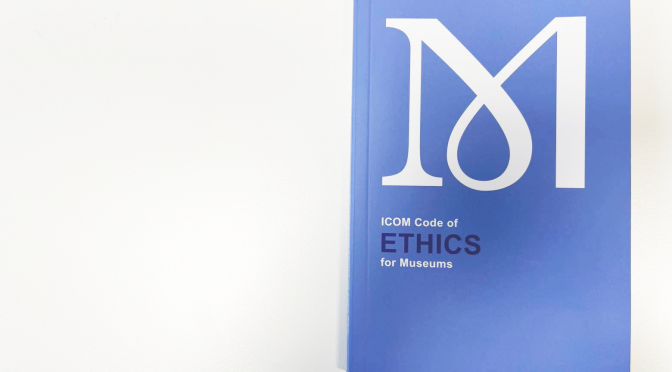I arbeider med revidering av ICOMs etiske regelverk Code of Ethics for Museums, inviteres de nasjonale ICOM komiteene å sende inn innspill til siste utkast.
Norsk ICOM sender inn felles innspill på vegne av våre medlemmer innen 30.april. Innspill fra våre medlemmer må derfor sendes til sekr@icom-norway.org innen 25.april.
Se siste utkast av det etiske regelverket.
Se presentasjon fra webinar 04.04.2025
med kort introduksjon ved Kathrin Pabst, ETHCOM, etterfulgt av presentasjon om revisjonsprosessen ved Sally Yerkovich. Sally Yerkovich leder gruppen som reviderer ICOM Code of Ethics for Museums.
Revisjonskomiteen ønsker svar på følgende spørsmål:
Does Principle “SOCIETY: Museums Serve Society” as a whole meet your expectations? *
Do Statements (and their Descriptions) of Principle “Society: Museums Serve Society” meet your expectations?
- 1.1. Museums should preserve and transmit tangible and intangible heritage for the benefit of society and the long-term sustainability of communities. *
- 1.2. Museums should support the right and the agency of diverse members of society to participate in and contribute to cultural life.
- 1.3. Museums should collaborate with internal and external partners, fostering dialogue and knowledge sharing through enduring cooperation.*
- 1.4. Museums should guarantee accessibility to all. *
- 1.5. Museums should represent cultural diversity while respecting the cultural sensitivities reflected in heritage. *
- 1.6. Museums should practice sustainability, proactively and continually, in its social, environmental and financial dimensions. *
Does the Principle PROFESSIONALISM: Museums operate and communicate with professional expertise, knowledge and standards” as a whole meet your expectations?*
- 2.1. Museum leaders should recruit staff and volunteers that safeguard the institution’s need for professional knowledge and reflect the diversity of the communities they work with.*
- 2.2. Museum leaders should care for the safety and well-being of staff and volunteers. *
- 2.3. Museum leaders should scrutinise the use of digital technologies in all working areas. *
- 2.4. Everyone who works in and with museums should always demonstrate courtesy, respect and integrity. *
- 2.5. Everyone who works in and with museums should follow the policies and procedures of the museum.*
- 2.6. Members of the museum profession should collaborate and consult colleagues, other experts, and community members outside the museum when needed. *
- 2.7. Members of the museum professions should work actively to prevent the illicit trafficking of cultural property. *
- 2.8. Everyone who works in and with museums should protect confidential information obtained as part of their work. *
- 2.9. Everyone who works in and with museums should guard against any conflict of interest with the museum.*
- Does the Principle “EDUCATION: Museums offer diverse experiences for knowledge sharing and reflection.” as a whole meet your expectations?*
Do Statements (and their Descriptions) of Principle EDUCATION: Museums offer diverse experiences for knowledge sharing and reflection” meet your expectations?
- 3.1. Museums should reach out to diverse audiences, conducting all activities in accordance with their mission. *
- 3.2. Museums should preserve the integrity of information. *
- 3.3. Museums should develop relationships of collaboration and trust, creating enduring partnerships with communities, heritage and educational institutions, and associates. *
- 3.4. Museums should be accessible to all audiences and consider their needs, interests and beliefs to ensure that they can benefit equitably from the museum’s educational activities.*
- 3.5. Museums should attend to all sensitive materials with care, striving to use them in educational programmes, exhibitions and publications in ways that are consistent with professional standards. *
- 3.6. Museums should foster knowledge sharing and reflection. *
- 3.7. Museums should use technology responsibly in their educational programmes, exhibitions and publications. *
- 3.8. Museums should be committed to maintaining their capacity to care for heritage for future generations, and educate audiences about sustainability through educational programmes, exhibitions and publications. *
- 3.9. Museums should engage in reparative practices as a means of enhancing learning and critical reflection, supporting the right of communities to recover their cultural heritage.*
- Does the Principle COLLECTIONS: Museums research and collect” as a whole meet your expectations?*
Do Statements (and their Descriptions) of Principle “COLLECTIONS: : Museums research and collect” meet your expectations?
- 4.1. Museums should create and maintain a collections policy.*
- 4.2. Museums should be responsible stewards of the collections in their care. *
- 4.3. Museums should follow professional acquisition and accessioning procedures. *
- 4.4. Museums should establish documentation procedures and databases to protect and ensure the sustainability of their collections.*
- 4.5. Museums should provide access to heritage for research and study. *
- 4.6. Museums should conduct research in collaboration with diverse members of society to enhance the understanding and interpretation of heritage.*
- 4.7. Museums should store and display collections of sensitive materials with care and respect.
- 4.8. Museums should develop procedures for responsible deaccessioning and disposal.
- 4.9. Museums should participate in the fight against illicit trafficking of tangible and intangible heritage.
- 4.10. Museums should be responsive to requests for restitution, repatriation and return.
- Does the Principle GOVERNANCE: Museums are not-for-profit, permanent institutions as a whole meet your expectations?
- 5.4. The governing body should ensure that the board members and museum leader have the knowledge and skills needed to fulfil their roles.
- 5.5. The governing body should adopt written policies that are essential tools for the museum’s governance.
- 5.6. The governing body should reflect the diversity of the communities they serve
Do Statements (and their Descriptions) of Principle ‘ GOVERNANCE: Museums are non for profit, permanent institutions’ meet your expectations?
- 5.1. The governing body should maintain publicly accessible evidence of their legal status and not-for-profit nature as well as their mission statement and policies.
- 5.2. The governing body should secure the resources necessary for sustainable museums
- 5.3. The governing body should safeguard the museums’ integrity and institutional autonomy.
- 5.7. The governing body should facilitate effective and open communication within the institution and with external stakeholders, promoting transparency while respecting confidentiality and privacy, where appropriate.

